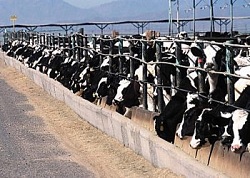 |
| Cattle feedlot--Courtesy of EPA |
After scrutinizing dust samples collected from the Great Plains for years, a team of scientists at Texas Tech University has published a study showing that DNA from antibiotic-resistant bacteria is airborne. The source of the bugs: cattle feedlots.
It has long been understood that people can contract antibiotic-resistant infections by eating meat from animals treated with the drugs--a danger that has prompted regulatory bodies worldwide to launch new initiatives to curb the use of antibiotics in food animals. This study, published in the journal Environmental Health Perspectives, suggests people may be breathing the bugs, too.
The Texas Tech team collected dust samples, both downwind and upwind, near 10 commercial cattle feedlots in the Texas Panhandle and South Plains. Tens of thousands of cattle are held there, gaining weight as they are prepared for slaughter, according to the Texas Tribune. It has been common practice among food producers to fatten up healthy animals with antibiotics.
"The 'aha' moment came when we saw how much more prevalent resistant sequences were downwind than upwind," co-author and Texas Tech molecular biologist Gregory Mayer told the Texas Tribune. "It was not just higher in some of them--it was 4,000 percent more. It made me not want to breathe."
Some in the cattle industry are protesting the report, suggesting that it exaggerates the risk that antibiotic-resistant bugs pose to human health. "If I truly thought that the usage of these products was putting anyone at danger, I wouldn't be using them," said veterinarian Sam Ives of the Texas Cattle Feeders Association, according to the Tribune.
Combating antibiotic resistance is a major priority of the Obama administration. Last week, the president rolled out a $1.2 billion, 5-year plan that includes eliminating antibiotics that are important in human medicine for growth-promotion in food animals. Some critics contend the plan doesn't go far enough to curb the practice, but worldwide concerns about antibiotics resistance have already had an impact on food producers: In March, fast-food giant McDonald's ($MCD) said it's phasing out all chicken raised with antibiotics that are also used to treat people.
Texas Tech's Mayer and his colleagues admit that it's not yet clear what happens when airborne antibiotic-resistant bugs settle. But they are concerned that the DNA from these superbugs could spread to other bacteria, which would exacerbate the overall problem of resistance.
- here's the Texas Tribune story
- access the Environmental Health Perspectives article here